ACM20221
Certificate II in Horse Care

Kickstart Your Career with Horsepower
Study Horse Care with ACAC
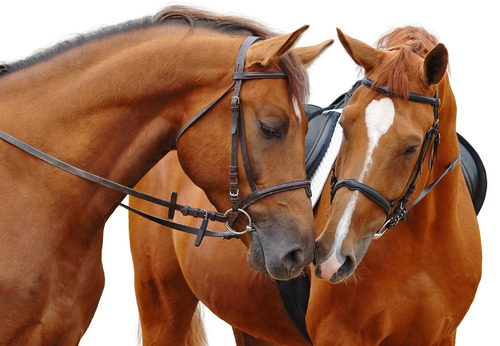
QUICK COURSE DETAILS
Blended or Distance Learning.
You will have an online with printed learner’s guides component, and a practical component with horses.
18 months
Extensions available.
New students start on the first Monday of every month.
Enrolments close on the 15th of the month prior.
Decide later if it’s right for you.
If you’re passionate about horses but haven’t yet chosen a specific career direction, this course provides an excellent foundation for your journey. It’s also an ideal choice for high school students wanting to include vocational training in their senior years, combining a love for horses with practical, job-ready skills.
The ACM20221 Certificate II in Horse Care not only prepares you for entry-level roles in the equine industry but also serves as a valuable stepping stone to further study and qualifications—such as the ACM30821 Certificate III in Horse Care, equine veterinary nursing, or specialist equestrian pathways.
Practical Experience Requirement: As part of your Certificate II in Horse Care, you’ll need to work with at least three friendly, reliable horses—the kind everyone loves for their calm and gentle nature. Whether you have your own suitable horses (with access to an Approved Equine Coach to act as supervisor), want to gain experience with our beautiful fjord horses here at our Victorian farm, or prefer to learn at a local riding school, you have plenty of flexible options. You can even combine locations to suit your needs. If you choose lessons at a riding school, or use your own coach, please note that standard lesson fees may apply.
Students enrolled in the ACM20221 Certificate II in Horse Care receive high-quality training, assessment, and support from ACAC’s experienced team, through a collaborative partnership with Halo Nation Training Pty Ltd (RTO 32485).

Apply. Decide.
Start when you’re ready.
Apply for free and take the first step. We review your application, confirm your place, and you decide when you are ready to enrol.
No payment or commitment until you say yes.
Decide later if it’s right for you.
Nationally Recognised Training
The ACM20121 Certificate II in Animal Care is a nationally recognised qualification delivered by ACAC on behalf of Halo Nation Training Pty Ltd (RTO 32485), the Principal RTO. This course is offered under a formal third-party agreement between ACAC and HaloNT. For more information refer to the FAQ.
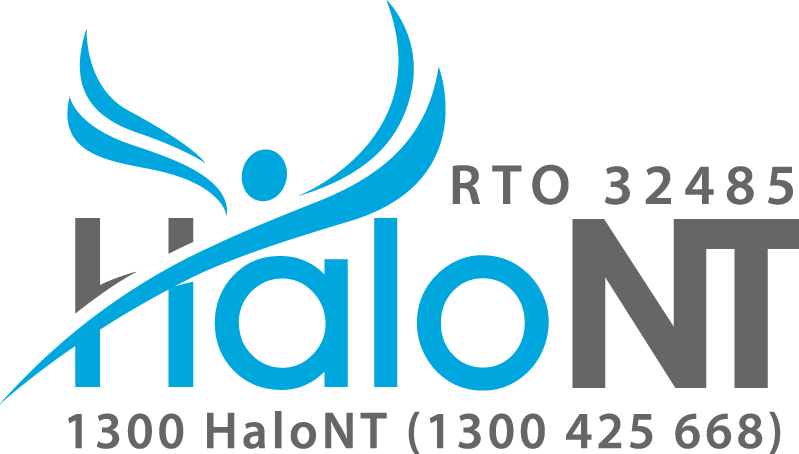
What Will I Study in the
ACM20221 Certificate II in Horse Care?
This subject provides the essential skills and knowledge required to confidently and safely handle calm, well-educated horses in a range of equine environments. You’ll learn how to safely identify, catch, control, and release horses, with a strong focus on minimising risks and supporting the welfare of both horses and handlers.
Beyond practical handling, the subject also explores the fundamentals of horse behaviour—how horses perceive the world, communicate, and respond to their environment. You’ll gain an understanding of how horses learn, including the principles of pressure and release training, positive reinforcement and effective training methods, helping you to work with horses in a way that is safe, humane, and productive.
By combining safe handling techniques with a deeper awareness of equine behaviour and learning, this subject prepares you to interact with horses responsibly and confidently, whether you’re starting out or looking to build on your existing experience.
This subject is a gateway subject, that is you must complete and pass it before you can undertake any of the other horse handling or riding units.
This subject credits over to the ACM30821 Certificate III in Horse Care.
This subject requires a practical assessment to occur with three different horses being caught, led, handled, hoof cleaned and returned to the paddock.
Horse Care Essentials introduces you to the daily routines and responsibilities involved in caring for horses. This subject covers the practical skills and foundational knowledge needed to keep horses healthy and comfortable, including feeding, grooming, cleaning stables, and maintaining safe and hygienic environments.
You’ll learn how to perform routine care tasks under supervision in a variety of settings, such as stables, paddocks, and yards. Through hands-on activities and real-world scenarios, you’ll build confidence in handling day-to-day horse care, develop attention to detail, and understand the importance of good husbandry practices.
This subject requires a practical task where you record your actions caring for one horse over a period of a week. This could be your own horse, or a horse at a facility you are attending daily.
Equine Health Support focuses on the essential skills and knowledge needed to monitor horse health and assist with basic treatments. In this subject, you’ll learn how to carry out routine health checks, recognise signs of illness or injury, and report concerns promptly. You’ll also gain experience providing simple treatments under direction, as well as supporting others—such as supervisors or veterinary professionals—when more advanced care is required.
You’ll practise these tasks in a supervised setting, building your confidence and competence in everyday horse health care. This subject also introduces you to common horse health issues, basic first aid, and the importance of observation and communication in maintaining the wellbeing of horses.
This subject requires a practical assessment involving two different horses and undertaking set health treatments.
Safe Horse Transport equips you with the essential skills and knowledge needed to safely load and unload horses from transport vehicles. This subject focuses on practical techniques and safety precautions that protect both the handler and the horse throughout the transport process.
You’ll learn how to prepare horses for travel, use appropriate equipment, and follow step-by-step procedures for loading and unloading in a range of environments—including stables, paddocks, event venues, and public areas. Emphasis is placed on understanding horse behaviour during transport, recognising signs of stress, and applying calm, confident handling.
This subject credits over to the ACM30821 Certificate III in Horse Care.
This subject requires a practical assessment to occur with three different horses being loaded and unloaded onto a float or truck.
Grooming Horses covers the specialist skills and knowledge needed to get horses ready for competitions, shows, and commercial sales. In this subject, you’ll learn how to wash, groom, and trim horses’ coats to meet presentation standards, as well as how to clean and correctly fit gear for a professional and compliant appearance.
You’ll explore techniques for making horses look their best while maintaining their comfort and welfare, and you’ll practise preparing horses in a variety of environments, including wash bays, grooming areas, yards, and event venues. The subject also teaches you how to interpret different presentation requirements, use your judgement to meet high standards, and care for valuable animals with attention to detail.
This subject credits over to the ACM30821 Certificate III in Horse Care.
This subject requires a practical assessment to occur where you prepare one horse for two separate events, OR two horses for the one event. For one horses this must include mane and tail trimming.
Lunging Horses introduces you to the essential techniques and knowledge required for exercising horses safely from the ground. This subject focuses on the correct use and fitting of lungeing equipment, understanding safe lungeing practices, and recognising the signs of fatigue or stress in horses before, during, and after exercise.
You’ll learn how to lunge calm, well-educated horses under supervision in a variety of settings, such as yards, exercise arenas, and event areas. The subject also explores the reasons for lungeing, the basics of horse movement and behaviour during groundwork, and key safety considerations for both handler and horse.
This subject credits over to the ACM30821 Certificate III in Horse Care.
This subject requires a practical assessment to occur with three different educated calm horses, over 10 minutes of lunging each.
Equine Biosecurity & Infection Control equips you with the essential skills and knowledge to protect the health of horses and the wider community by preventing the spread of infectious diseases. In this subject, you’ll learn how to apply effective biosecurity and infection control procedures across different equine settings.
You’ll explore the principles of disease prevention, practical steps to minimise disease transmission, and how to respond to potential outbreaks. This subject also covers how to recognise and report signs of illness, maintain hygiene standards, and use personal protective equipment appropriately.
This subject credits over to the ACM30821 Certificate III in Horse Care.
This subject requires a practical assessment to occur with three different educated calm horses, and a range of biosecurity and infection control tasks.
To complete your qualification, you’ll need to obtain a current First Aid certificate by undertaking a human first aid course with a registered training provider (HLTAID011 Provide First Aid). This important step ensures you’re equipped with essential emergency skills for any workplace, and your certification must be supplied before graduation.
This cost is in addition to your course fees with us and can be completed at a provider of your choice near you.
Equine First Aid provides you with the essential skills and knowledge to respond effectively to health emergencies and routine health concerns in horses. In this subject, you’ll learn how to accurately measure and record vital signs, recognise and report signs of common illnesses and injuries, and provide immediate care in emergencies.
You’ll gain practical experience following first aid policies and procedures specific to horses, ensuring you can act quickly and confidently when a horse needs help. The subject also covers when and how to escalate care to veterinary professionals, the importance of clear communication, and maintaining accurate records.
This subject credits over to the ACM30821 Certificate III in Horse Care.
This subject requires a practical assessment to occur with three different educated calm horses, and a range of biosecurity and infection control tasks.
You must choose 3 from the following list:
Riding Horses A introduces you to the foundational skills and knowledge needed to safely ride calm, well-trained horses under supervision. This subject focuses on building your confidence and ability to control a horse at walk, trot, and canter within a secure environment such as exercise yards or fenced arenas.
You’ll learn how to work with horses that are suited to beginner riders, developing essential riding techniques while always prioritising the safety and welfare of both rider and horse. The subject also covers key safety considerations and risk awareness, helping you understand how to manage potential hazards when working with and around horses.
By completing Riding Horses A, you’ll gain the practical riding skills, safety awareness, and foundational knowledge required for entry-level riding tasks, setting the stage for further learning and progression as a capable, responsible rider.
This subject credits over to the ACM30821 Certificate III in Horse Care.
If you do not have access to your own horses and coach and already, you will need to enrol with an approved riding school to complete the necessary lessons to learn to ride. Horse riding lesson costs are not included in your course fees.
This subject requires practical assessment of your ability to control two different horses through walk, trot and canter in an arena, at least three times each, including some when other horses are present in the arena too. This is a minimum of SIX assessed rides with an approved riding instructor.
Ride Horses B builds on the foundational skills gained in Riding Horses A, taking your riding to the next level. In this subject, you’ll learn to ride educated horses both on the flat and while negotiating set obstacles, gaining confidence in a variety of controlled and open environments—such as paddocks, exercise yards, arenas, trails, and event venues.
You’ll develop more advanced riding techniques while continuing to prioritise the safety and welfare of both horse and rider. The subject covers risk assessment, safe riding practices, and how to manage different riding situations and environments, ensuring you’re well-prepared for real-world challenges.
Prerequisite: You must successfully complete Riding Horses A before commencing in Ride Horses B.
If you do not have access to your own horses and coach and already, you will need to enrol with an approved riding school to complete the necessary lessons to learn to ride. Horse riding lesson costs are not included in your course fees.
This subject credits over to the ACM30821 Certificate III in Horse Care.
If you do not have access to your own horses and coach and already, you will need to enrol with an approved riding school to complete the necessary lessons to learn to ride. Horse riding lesson costs are not included in your course fees.
This subject requires practical assessment of your ability to control two different horses through walk, trot and canter in an arena AND out in the open AND negotiating obstacles, at least three times each, including some when other horses are present in the arena too.
You will have to demonstrate transitions within the gait, as well as between gaits, be able to perform rising and sitting trot, and be able to canter more than 500 metres.
This is a minimum of SIX assessed rides with an approved riding instructor.
Personal Health & Fitness for Equine Work focuses on the skills and knowledge you need to maintain your own wellbeing while working with horses. This subject covers the basics of health and nutrition, the importance of staying physically fit for hands-on equine roles, and practical strategies for managing stress and workplace fatigue.
You’ll learn how to assess your own fitness and nutrition needs, adopt safe work practices, and develop routines that support your energy and effectiveness on the job. The subject also explores ways to prevent injury and burnout, helping you build habits that contribute to a long and successful career in the horse industry.
This subject credits over to the ACM30821 Certificate III in Horse Care.
Equine Welfare equips you with the skills and knowledge to evaluate the welfare of horses using recognised animal welfare assessment frameworks and tools. In this subject, you’ll learn how to systematically observe and assess the physical and behavioural wellbeing of horses across different environments—such as stables, paddocks, training facilities, and event venues.
You’ll explore industry-accepted models for welfare assessment, understand what good equine welfare looks like, and develop the ability to identify signs of compromised welfare. The subject emphasises the importance of accurate monitoring, record-keeping, and clear reporting to ensure horses receive the care they need.
This subject credits over to the ACM30821 Certificate III in Horse Care.
This subject requires you to have access to, but not necessarily handle, two horses to perform welfare assessments on.
Basic Hoof Care introduces you to the essential skills and knowledge required to maintain healthy horse hooves as part of routine care. In this subject, you’ll learn how to safely check horse hooves and shoes, identify common issues affecting hoof health and function, and apply simple treatments when needed.
You’ll gain practical experience in removing loose or damaged horse shoes and recognising situations that require professional attention from a farrier or veterinarian. The subject emphasises the importance of regular hoof checks and preventive care to support the horse’s overall wellbeing and soundness.
This subject credits over to the ACM30821 Certificate III in Horse Care.
This subject requires practical assessment of your ability to perform basic hoof care routines with THREE different calm horses.
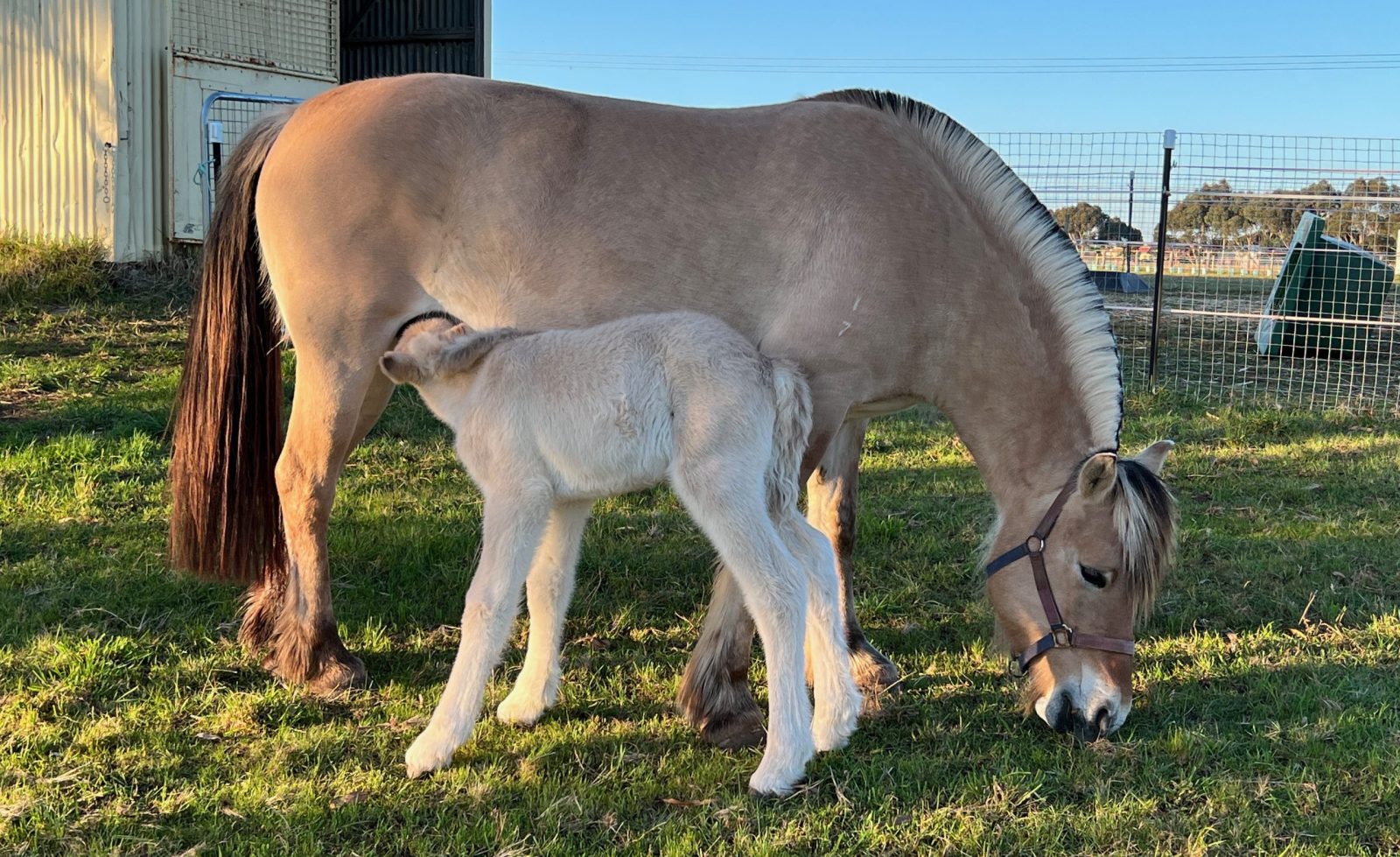
Hands-On Horse Learning—Your Way
For students who own, or have access to, three calm suitable horses & an accredited horse riding coach.
REQUIREMENTSFor students completing practicals at an approved horse riding school or centre near them.
LEARN MOREFor students completing practicals or placement at Tarcombe Fjords in Little River, Victoria.
ABOUT THIS OPTIONGet Started on Your Dream Career!
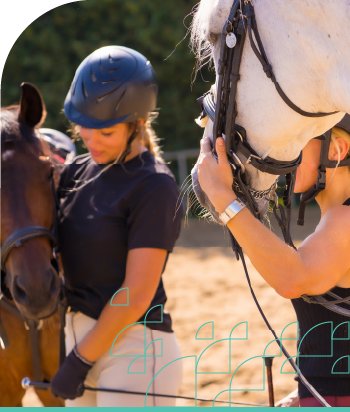
For students completing practicals at an approved horse riding centre near them or with their own horses.
Start your studies at our next intake with a first instalment of
Then simply pay
15 x $314/month or
30 x $157/fortnight.
That’s about $80/week!
Total Course Fee: $5454
For students completing practicals at Tarcombe Fjords.
Start your studies at our next intake with a first instalment of
Then simply pay
15 x $470/month or
30 x $235/fortnight.
That’s about $117.50/week!
Total Course Fee: $7995
Overseas Students Welcome!
Don’t live in Australia? That’s no barrier to studying with us. We’re more than happy to have you as a student, and we don’t charge huge international student fees either. Before enrolling with us, we’d like you to be fully informed. Please read the Overseas Student Information by clicking the button below.
LEARN MORE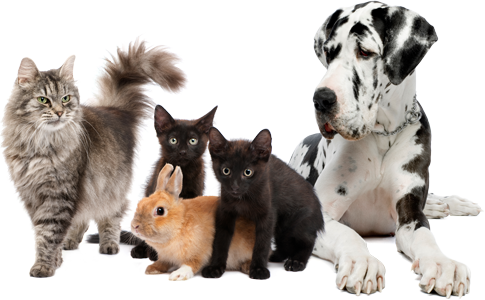
Additional Information on the
ACM20221 Certificate II in Horse Care
To be eligible to enrol in this course, you must:
Apply for free
Apply online. No cost. No obligation.
As part of your application you will complete a short Digital Literacy and LLN check so we can support you the way you need.
We review and confirm
Our team reviews your application and sends you an acceptance email with the enrolment form link.
Start when ready
Enrol, pay your deposit, and begin studying. Printed learner guides are sent after induction.
PAYMENT PLANS AVAILABLE:
You will be given 18 months access to our Learning Centre to complete your course. To avoid any course extension fees you do need to complete the course in this time frame.
PLEASE NOTE:
Prices current from 1st July 2025. All prices include resource fees, tuition costs, and administration fees. Additional fees may apply if you do not pass an assignment after two attempts, you need to re-enrol in a subject for any reason, or you need longer than 18 months to complete the course.
Course fees DO NOT include any payment of fees required by your horse riding coach or horse riding centre/school. These must be paid direct to the coach or centre.
Unfortunately at this time there is no government funding available for this course. We do encourage you to contact your local job seeker service or apprenticeship centre for further suggestions. School based students may have access to funding and should discuss this with their school.
You can, however, enrol with one of our instalment plans and spread the cost out.
For this qualification to be awarded, you must complete 13 units of competency. Five of these are core units, and the remaining eight are electives. 6 electives are set in our course structure and cannot be changed. The remaining 2 can be chosen from riding or horse care related units.
The core units you will cover within your subjects are:
You will also cover the following elective units:
And you must choose 3 electives from the following:
To complete this course, you are required to complete practical assessments with calm and reliable horses, three different ones in fact, to meet unit requirements.
We have three different ways you can achieve this:
It is important to note that your course fees do not include any additional fees your horse riding coach or riding centre may require. Some are happy to provide learning opportunities at no additional cost (eg you already undertake lessons with them, or will do a work placement), others will require their standard lesson fees to be paid. Please ensure you discuss this with your coach or the riding centre prior to enrolment.
We start off new students on the first Monday of every month except December. Enrolments close on the 15th of the month prior.
The course is delivered by distance education using our online ‘Learning Centre’ with printed learner’s guides AND practical experience with your own horses and coach, at a riding school/centre, or at our breeding stud ‘Tarcombe Fjords’, in Little River Victoria.
This allows you the flexibility to study when it suits your schedule and your location. We’ve designed the course to fit around your work and lifestyle.
Once the course starts, you’ll receive printed learner’s guides, which will guide you through your studies and prepare you for assessments. You’ll also have access to the extra study resources available via our ‘Learning Centre’ online.
Each subject contains various assessment tasks:
This course is designed to be completed within 18 months. If you are still in school, you may consider requesting an extension to accommodate your schedule. Typically, students should plan to dedicate at least 5 hours per week to their studies. This ensures sufficient time for completing required readings and assessment tasks. However, if you are able to progress more quickly, you have the option to finish the course sooner.
Please note, additional fees will be incurred if you wish to extend your study period beyond the initial 18 months.
If you wish to learn to ride whilst completing this course, we recommend enrolling with a riding school when you commence your studies, as you may need the 18 months to learn to confidently walk, trot and canter to meet the riding units requirements. If you do not wish to undertake the riding units, you can select the horse care units instead.
Ready to learn more? After you’ve completed this course you can move on to:
Veterinary Nurse Solutions, trading as the Australian College of Animal Care (‘ACAC’), has a third party arrangement with Halo Nation Training Pty Ltd (‘HaloNT’) which is a Registered Training Organisation (RTO). In this arrangement, HaloNT is the ‘Principal RTO’, and ACAC are offering the qualification on their behalf.
At all times, the Principal RTO is responsible for the quality of the training and assessment you will receive in compliance with Standards for RTOs, and for the issuance of the Australian Qualifications Framework (AQF) certification documentation. These Standards set out the requirements that an organisation must meet in order to be an RTO and ensure the integrity and quality of nationally recognised training provided by registered training organisations.
Students are enrolled with HaloNT as the principal RTO.
All training is conducted by ACAC on behalf of HaloNT, the principal RTO. All learning and assessment materials are developed by ACAC and approved by HaloNT.
All trainers and assessors are employed by ACAC, but are approved by HaloNT.
In the first instance you can provide feedback and make a complaint directly to us, ACAC at [email protected]. You are also able to make a complaint or provide feedback directly to the Principal RTO, HaloNT directly at https://www.halont.edu.au/.
On successful completion of all course requirements students are provided with the appropriate qualifications and statements of attainment issued by the Principal RTO, Halo Nation Training Pty Ltd, RTO ID: 32485.
Students can contact either ACAC and we can assist you to organise this. You are also able to directly contact HaloNT to obtain a new copy of a certificate.